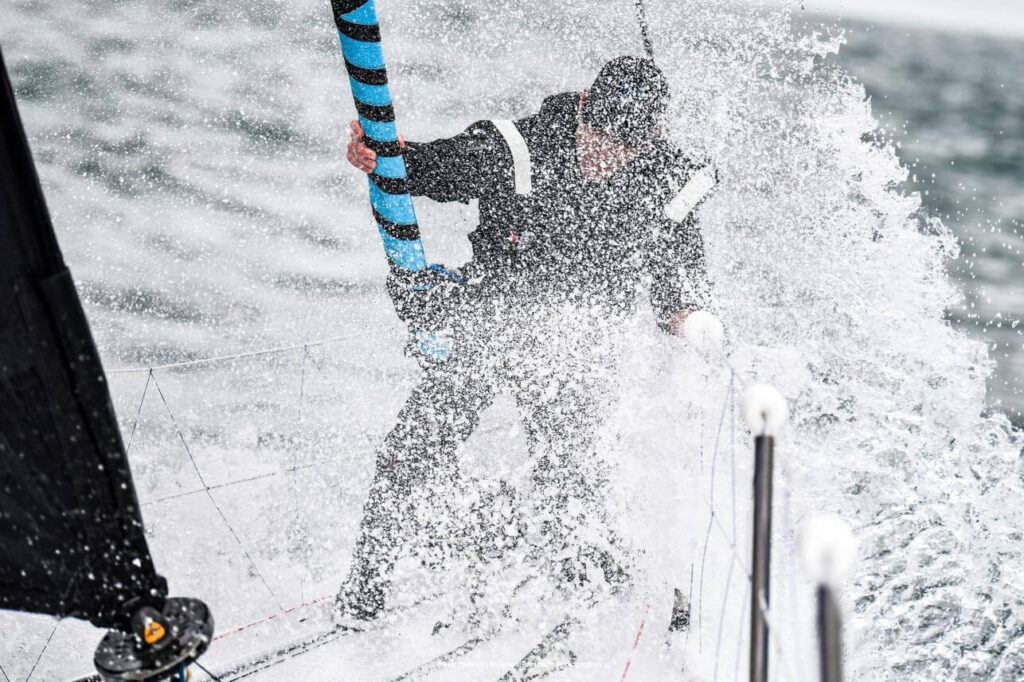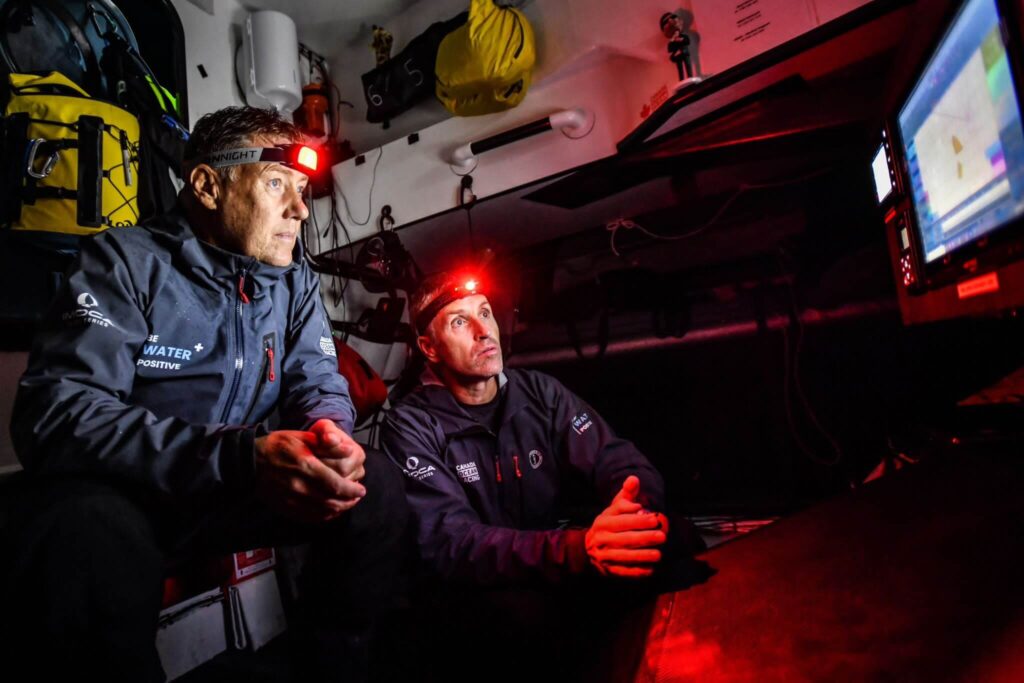Both Scott and I are back in our respective homes, licking our wounds, sharing texts, calls and generally checking in on each other. The relationship built through planning a challenge, training for it and the execution has always been a valued part of these types of projects for me and in the case of an unsuccessful attempt at a goal, communicating with the only other person who really knows the ‘what and why’ holds some form of therapy in sharing the mix of emotions that comes with, dare I say it, failure.
For those who are picking up this thread for the first time, Canadian athlete, adventurer, and sailor Scott Shawyer and I teamed up to take on the double-handed ocean yacht racing epic the Transat Jacques Vabre. This is an iconic race from Le Harve, France, to Martinique, a passage duration of around 15 days of high-intensity racing in some of the world’s most brutal and fastest offshore racing yachts.
Our misfortune commenced early at sea. While setting up for the race pre-start we noticed a malfunction with our mainsail that was very challenging to assess in the rough sea state. The decision was made to take the start under headsail alone and then head to the shelter of the port of Le Harve where our support team would board the boat and implement a makeshift repair. Almost four hours later we left the harbour in pursuit of the rest of the fleet.

This was our first resilience test and the experience fuelled us both. We left with gratitude to our team and a fire in our souls, determined to reconnect with the competition and take on the big weather due to engulf the fleet that evening. By nightfall on day one we had made the gains we were seeking, we were working incredibly well together and making great decisions.
In reflection, it was around nightfall when Scott first mentioned to me that something within was not quite right. The conditions were rough with much larger waves and stronger winds in the forecast ahead before a reprieve on the back side of the strong weather system, a reprieve that the whole fleet was focusing on. We knew that to make it through the night in good shape would set up the rest of our race.
We continued to push hard through the evening with many manoeuvres around the Cherbourg peninsula and through the Channel Islands until the wind direction ahead of the front settled into the southerly quadrant lining up our course to face the brunt of the system head-on. By now we were facing winds consistently above 30knots in strength and a building sea state, a brutal environment, and a mix of violent motion, waves breaking across the decks and mounting fatigue. Difficult but all part of the process.
After Scott first mentioned that he wasn’t feeling right, we kept checking in on each other at each active watch change. He was performing at his usual high standard under the conditions, without any signs of cognitive failings. The conditions on board were harsh, not just for us but for the whole fleet. It was clear that many sailors would suffer in their own way over the next 30 hours.
At 4:30am I noted the time on the whiteboard in our cockpit, next to the navigation computer screen that I had recently fallen into and smashed. We were beginning to push into the most intense sector of the weather system. The motion of the boat was horrendous and at times we felt like rag dolls, the sound of our carbon hull slamming and the wind screaming was intense. Strangely, I personally felt at peace, energised and at home. After a long hiatus from this sport and after doubting myself immensely prior to the start, I was where I belonged, in my bubble, pushing aside any negative thoughts with a complete focus on managing myself in the environment. I ignored the pain, the risk, the discomfort and embraced the battle between man, machine and the environment.
Whilst the above sounds selfish in an intense two-person team environment, I also noted the 4:30am time stamp as the point at which I saw a significant change in Scott’s health. From this point, the focus became very defined; manage the boat in the conditions, make safety a priority and look after each other.
Scott was digging deep. We are yet to determine what drew so heavily on his personal resources but every inch he moved took extreme effort, we were both sure that this was not simply seasickness. It was dark, we had large breaking waves crashing over us, and we were pushing across a shipping lane in very low visibility in winds now peaking at 40knots… the real deal. Strangely, I was worried about Scott yet inspired by his will to keep pushing in equal measure. Scott is of elite-level fitness, his body is a temple and he was clearly frustrated by his failing energy and functionality.
Over the next few hours and through the fury, we talked a lot about how to best manage the situation. Fortunately, I felt capable. My body and mind had clicked into a natural rhythm in a world that I knew well. We knew we could trade support, and while Scott felt he was leaning on me in the moment, I knew he would repay me with a few extra hours of sleep or a hot meal at some point down the track. We both knew that either of us could manage the boat solo if need be. We were safe and in a manageable situation.
The brunt of the storm system lasted around four hours during which time Scott’s health deteriorated significantly. This highlighted something we know well as offshore sailors, the heavy weight of isolation and vulnerability that significantly heightens any level of risk. It was clear that the overwhelming sense of remoteness and lack of serious medical aid had cast a heavy blanket over us both and the project. With the depth of detail not being something I can share, I think it is fair to say that by the time we had pushed through to the other side of the storm, a point of reprieve that we had both focused on so heavily from the start, we knew that we had much larger priorities onboard than the race.

After deep consideration, we altered course towards land with the clear aim of seeking shelter, support and answers.
Scott is now back in Canada and recovering. I am on the Isle of Wight, disappointed but strangely inspired and motivated. On reflection, I joined this team in the hope of helping Scott achieve certain goals. I have now started 22 TransAtlantic passages and finished 20. I have also previously placed third in this race. I am disappointed in myself for not being able to drag us both to a race finish in Martinique but am not so full of bravado to not understand what is most important.
In our parting words once back on land, Scott said ‘Thanks for getting me back safely’, something we achieved together and with the support of the whole team.
I would like to extend my sincere thanks to our families, friends and awesome team who give so much of themselves so that we can not only compete at an elite level but also keep us safe. A massive thanks to my teammate Scott and 5West for believing in a washed-up old salt, for coaxing me out of retirement and giving me the opportunity to face my self-doubts and the chance to realise many reminders, most notably, how much I love the sea and the battle in offshore yacht racing. Thank you for the friendships that we have built and for the courage and experience that we shared.
To our partners and the purpose behind ‘Be Water Positive’; the IDA and H2O Innovation, thank you for your trust and support. This is a journey within a much larger awareness initiative, this will not be the only setback on the road to ultimate achievement.
To those who encourage and support, my deepest and most heartfelt thanks and appreciation. You genuinely help quell the discomfort and provide the drive to keep moving forward.
With sincere gratitude, Nick
